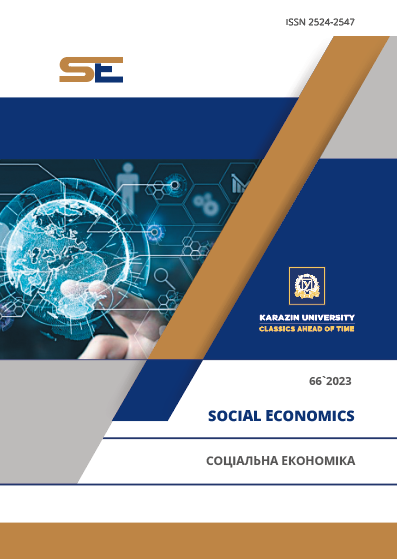ARTIFICIAL INTELLIGENCE AS AN OBJECT OF MANAGEMENT: A BENEFIT FOR CIVILISATION OR A THREAT TO MANKIND?
Abstract
The authors of the article analyze the reasons for the rapid development and implementation of artificial intelligence achievements, which opens up great opportunities for solving problems in many industries and is a reliable assistant to people in everyday life. The article analyses different approaches to the definition of "artificial intelligence", possible threats to humanity from its implementation, and focuses on the need to increase the responsibility of developers of programs, algorithms, systems and strengthen control over the work of users of equipment and devices with elements of artificial intelligence. People around the world have long been dependent on technical inventions and devices. The achievements of artificial intelligence provide people with convenience and comfortable conditions. The development of intelligent machines is an important area of scientific and technological progress. Artificial intelligence technologies contribute to solving many problems related to various areas of life, including the economy. Today, artificial intelligence is a global trend in technology development and innovation. Advances in computing power, the ability to collect and process huge amounts of information, and instant access to the latest algorithms are important prerequisites for the evolution of intelligent technologies. The development of sophisticated computers and robots poses risks to the world’s people. Without the use of artificial intelligence, the development of scientific and technological progress is impossible. Key words: artificial intelligence, the achievement of civilization, a threat to humanity, strengthening control over the operation of machines. Therefore, the development of intelligent machines and devices must continue, but with the warnings of global authorities who warn of the existing threat to humanity.
Downloads
References
REFERENCES
Savchenko, A. S., & Sinelnikov, O. (2017). Methods and systems of artificial intelligence. Kyiv: NAU. (in Ukrainian)
Kolpakova, I. (2021). Interview with S. Luk’janenko. Results of the week, 29, 21. (in Ukrainian)
Turing, A. M. (1950). I.-computing machinery and intelligence. Mind, LIX(236), October 1950, 433–460. doi: https://doi.org/10.1093/mind/LIX.236.433
Kuziomko, V. M., & Repnikova, I. P. (2017). The use of artificial intelligence in digital marketing. Market Infrastructure, 13. Retrieved from http://www.market-infr.od.ua/journals/2017/13_2017_ukr/21.pdf (in Ukrainian)
Kasatonov, V. (2020). Why are robots dangerous for humanity? Results of the week, 30, 26. (in Ukrainian)
Busol, O. (2015). Potential danger of artificial intelligence. Information and labour, 2, 24. (in Ukrainian)
Hilb, M. (2020). Toward artificial governance? The role of artificial intelligence in shaping the future of corporate governance. J Manag Gov, 24, 851–870. doi: https://doi.org/10.1007/s10997-020-09519-9
Yang, G., Ji, G., & Tan, K. H. (2022). Impact of artificial intelligence adoption on online returns policies. Ann Oper Res, 308, 703–726. doi: https://doi.org/10.1007/s10479-020-03602-y
Fosso Wamba, S., Queiroz, M. M., & Braganza, A. (2022). Preface: artificial intelligence in operations management. Ann Oper Res, 308, 1–6. doi: https://doi.org/10.1007/s10479-021-04450-0
De Mauro, A., Sestino, A., & Bacconi, A. (2022). Machine learning and artificial intelligence use in marketing: a general taxonomy. Ital. J. Mark, 2022, 439–457. doi: https://doi.org/10.1007/s43039-022-00057-w
Damioli, G., Van Roy, V., & Vertesy, D. (2021). The impact of artificial intelligence on labor productivity. Eurasian Bus Rev, 11, 1–25. doi: https://doi.org/10.1007/s40821-020-00172-8
Tsolakis, N., Schumacher, R., Dora, M. et al. (2023). Artificial intelligence and blockchain implementation in supply chains: a pathway to sustainability and data monetisation? Ann Oper Res, 327, 157–210. doi: https://doi.org/10.1007/s10479-022-04785-2
Lui, A.K.H., Lee, M.C.M., & Ngai, E.W.T. (2022). Impact of artificial intelligence investment on firm value. Ann Oper Res, 308, 373–388. doi: https://doi.org/10.1007/s10479-020-03862-8
Zahnitko, A. P., & Shchukina, I. A. (2008). Big explanatory dictionary. Modern Ukrainian language from A to Z. Donetsk: BAO Publishing House. (in Ukrainian)
Manning, Ch. (2020). Artificial Intelligence Definitions. Retrieved from https://hai.stanford.edu/sites/default/files/2020-09/AI-Definitions-HAI.pdf.
Charniak, E., & McDermott, D. (1985). Introduction to Artificial Intelligence. Addison-Wesley.
Kurzweil, R. (1990). The Age of Intelligent Machines. MIT Press.
McCarthy, J. (2007). What is artifical intelligence? Retrieved from https://www-formal.stanford.edu/jmc/whatisai/.
Russell, S. J., & Norvig, P. (2009). Artificial Intelligence: A Modern Approach. 3rd Edition. New Jersey: Pearson.
Roetzer, P. (2017). The Path to a More (Artifically) Intelligent Future. Retrieved from https://contentmarketinginstitute.com/2017/04/cognitive-content-marketing-ai/.
Ashlamov, I. S. (2021). War of slaves: what to fear? Arguments and facts in Ukraine, 5, 4. (in Ukrainian)
Smyrnova, Y., & Levchenko, K. (2020). Inhuman efforts. Arguments and facts in Ukraine, 52, 8. (in Ukrainian)
Voskresensky, V. (016). There will be no uprising of machines. Results of the week, 17, 27. (in Ukrainian)
Filchenkov, A. (2021). Hardworking people. Arguments and facts in Ukraine, 3, 5. (in Ukrainian)




